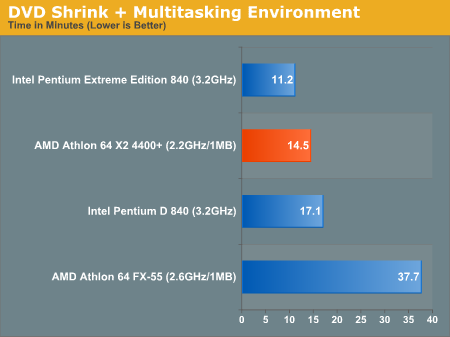AMD's dual core Opteron & Athlon 64 X2 - Server/Desktop Performance Preview
by Anand Lal Shimpi, Jason Clark & Ross Whitehead on April 21, 2005 9:25 AM EST- Posted in
- CPUs
Multitasking Scenario 1: DVD Shrink
If you've ever tried to backup a DVD, you know the process can take a long time. Just ripping the disc to your hard drive will eat up a good 20 minutes, and then there's the encoding. The encoding can easily take between 20 and 45 minutes depending on the speed of your CPU, and once you start doing other tasks in the background, you can expect those times to grow even longer.For this test, we used DVD Shrink, one of the simplest applications available to compress and re-encode a DVD to fit on a single 4.5GB disc. We ran DVD Decrypt on the "Star Wars Episode VI" DVD so that we had a local copy of the DVD on our test bed hard drive (in a future version of the test, we may try to include DVD Decrypt performance in our benchmark as well). All of the DVD Shrink settings were left at default including telling the program to assume a low priority, a setting many users check in order to be able to do other things while DVD Shrink is working.
We did the following:
1) Open Firefox using the ScrapBook plugin loaded locally archived copies of 13 web pages; we kept the browser on the AT front page.
2) Open iTunes and start playing a playlist on repeat all.
3) Open Newsleecher.
4) Open DVD Shrink.
5) Login to our news server and start downloading headers for our subscribed news groups.
6) Start backup of "Star Wars Episode VI - Return of the Jedi". All default settings, including low priority.
This test is a bit different than the test we ran in the Intel dual core articles, mainly in that we used more web pages, but with more varied content. In the first review, our stored web pages were very heavy on Flash. This time around, we have a much wider variety of web content open in Firefox while we conducted our test. There is still quite a bit of Flash, but the load is much more realistic now.
DVD Shrink was the application in focus. This matters because by default, Windows gives special scheduling priority to the application currently in the foreground. We waited until the DVD Shrink operation was complete and recorded its completion time. Below are the results:

In this test, the Athlon 64 X2 4400+ does better than the Pentium D 840, but the Extreme Edition manages to offer slightly better performance. A faster X2 shouldn't have much of a problem remaining competitive, however.










144 Comments
View All Comments
ceefka - Thursday, April 21, 2005 - link
So, would an nForce 3 250 board work with an A64 X2?smn198 - Thursday, April 21, 2005 - link
#4 "I find it strange why AMD did not release <2.2GHz A64 X2s? Maybe due to manufacturing issues?"When you make a dual core CPU, a defect on one of them makes the whole lot worthless. I believe that to try and reduce this, they can increase yield by producing lower clocked parts
L3p3rM355i4h - Thursday, April 21, 2005 - link
#9 you're dreamin' Theres no way that AMD can sell a 1.8ghz chip for sub-$200 when a frickin' venice is retailing for $179. A 1.8ghz chip would be upper $300 to lower $400s.But, damn the "X2" performs nicely. Just think, with a stable, higher performing motherboard with decent timings how much better it would get.
Shinei - Thursday, April 21, 2005 - link
Nice, dual-core. AMD's going to be hurt badly by the lack of volume on their X2 units, though, considering that Intel's got the money to post minor losses on each chip sold just to regain their marketshare. I'm surprised AMD hasn't tapped IBM to give them one or two 65nm fabs to prepare for the A64X2 launch later this year...AnnihilatorX - Thursday, April 21, 2005 - link
hm hope fab36 would increaswe production capacity of AMD and lower the cost down a bitblckgrffn - Thursday, April 21, 2005 - link
Awesome...I wish we could have seen a 4 socket 8 processor system rocking out with those four way xeons though, that would really illustrates some differences ;)I agree with the previous sentiment on the x2's, I hope they bring out a sub $200 1.8 ghz or so model. I will be sticking this in my desktop box, not my gaming box, so if they can't bring anything out under $200 I will probably have to go with Intel. Boo for that ;)
Nat
Zebo - Thursday, April 21, 2005 - link
It's a wonderful article Anand, always love yours.. very in-depth But you're forgetting mem timings??? Arr.:)Zebo - Thursday, April 21, 2005 - link
Slobber:Pblackbrrd - Thursday, April 21, 2005 - link
#4 AMD probably wants you to buy their single core cpus instead, as they are much cheaper to produce and easier to produce in quantities. AMD would probably have problems delievering a lower cost dual core in quantities .Who doesn't drewl for a A64 X2 after seeing this review??? I certainly do.
The dual core intel wouldn't be so bad either, except for the amount of heat it produces off.
filterxg - Thursday, April 21, 2005 - link
Nice article. AMD has obviously awoken a sleeping giant, and Intel is fighting back on the pricing front. Hopefully the gamble that AMD single cores can hold their own versus Intel Duallies is true on the mid-low end (at least for the near future). I won't be buying an Intel chip anytime soon (unless I need a laptop).Either way I figure I got 2.5 years before I need a dualcore, and by then who knows. So bravo to both companies for this innovation.